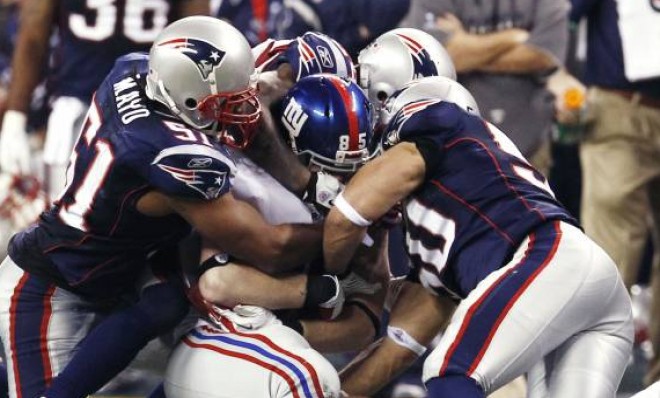Why the NFL's new helmet rule could do more harm than good
Critics say a change could leave players vulnerable to other injuries


A free daily email with the biggest news stories of the day – and the best features from TheWeek.com
You are now subscribed
Your newsletter sign-up was successful
The NFL on Wednesday approved a couple of new rules for the 2013 season, including one that will penalize players who initiate contact with the crown of their helmets.
It's the latest effort by the NFL to address player safety in response to a backlash over the league's handling of concussions and other head trauma. Yet despite the good intentions, players both past and present have criticized the move for watering down the game and potentially leaving running backs vulnerable to other serious injuries.
Under the new rule, which passed in a 31-1 vote by NFL owners, offensive and defensive players will be prohibited from lowering their heads and intentionally using the crown of the helmet to drop opposing players when they're outside the tackle box. Top running backs have used that tactic effectively to plow down defenders and rack up yards.
The Week
Escape your echo chamber. Get the facts behind the news, plus analysis from multiple perspectives.

Sign up for The Week's Free Newsletters
From our morning news briefing to a weekly Good News Newsletter, get the best of The Week delivered directly to your inbox.
From our morning news briefing to a weekly Good News Newsletter, get the best of The Week delivered directly to your inbox.
"This is a very important step in our continuing efforts to emphasize player safety," said St. Louis Rams coach Jeff Fisher, a member of the NFL committee that reviewed the rule change. "The players' habits, their reactions, their responses to rule changes, you see it on the field. This is just another step in that direction."
Even before its passage, the rule change generated intense debate, with coaches wondering how they would teach their players to adapt to a new running style. Seattle Seahawks coach Pete Carroll said the change was a "good move" overall, though, echoing a common refrain, he warned that it would be "very challenging" for referees to determine the intent behind helmet-first contact.
Some players, particularly running backs, bashed the new rule as a sign the league was going soft:
Furthermore, critics say the change actually makes runners less safe. Runners have to duck their heads to square their shoulder pads and protect their bodies, they argue.
A free daily email with the biggest news stories of the day – and the best features from TheWeek.com
"If you face contact with your eyes up, you will get hurt," Hall of Fame running back Marshall Faulk said of the change. "As a ball carrier, the only thing you can do to protect yourself sometimes is getting down, and that now can be taken as lowering your helmet and using it as a weapon. You take that away from a guy, and now you have to run up in there chin-first."
Fellow Hall of Fame running back Emmitt Smith blasted the change for the same reason.
"The first thing you do is get behind your shoulder pads," he said earlier this week. "That means you're leaning forward and the first part of contact that's going to take place is your head, regardless."
The league has said players will still be allowed to lower their shoulders for protection, so long as they don't deliberately use their helmets as a battering ram.
Proponents of the rule have argued that the league had to focus on that part of the body, given the heightened awareness of the long-term consequences of head trauma.
"This is a step toward discouraging players from using their helmet as a weapon," says AOL Sporting News' Clifton Brown. "That's a good thing. You can't talk about increasing player safety without rule changes toward that end."
Facing head trauma litigation from about 4,000 former players, the league has moved rapidly in the past few years to better protect players' brains. Most notably, the NFL redefined proper tackling form to discourage players from using their bodies as projectiles, and imposed stiffer penalties for helmet-to-helmet hits.
Jon Terbush is an associate editor at TheWeek.com covering politics, sports, and other things he finds interesting. He has previously written for Talking Points Memo, Raw Story, and Business Insider.
-
 Quentin Deranque: a student’s death energizes the French far right
Quentin Deranque: a student’s death energizes the French far rightIN THE SPOTLIGHT Reactions to the violent killing of an ultra-conservative activist offer a glimpse at the culture wars roiling France ahead of next year’s elections.
-
 Secured vs. unsecured loans: how do they differ and which is better?
Secured vs. unsecured loans: how do they differ and which is better?the explainer They are distinguished by the level of risk and the inclusion of collateral
-
 ‘States that set ambitious climate targets are already feeling the tension’
‘States that set ambitious climate targets are already feeling the tension’Instant Opinion Opinion, comment and editorials of the day
